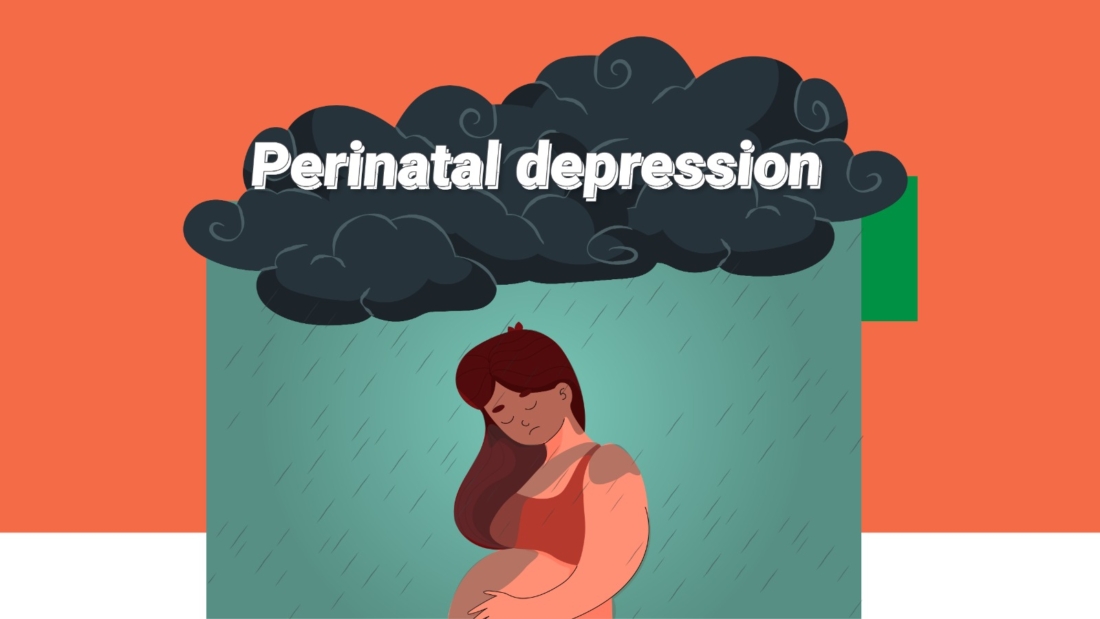The word “perinatal” refers to the time in a woman’s journey of childbirth and motherhood, that occurs before and after the birth of a child. “Perinatal Depression’ is the term given to refer to a mood disorder that affects women during various stages of pregnancy and after childbirth. This starts as early as during pregnancy; this is called a prenatal depression and can even arise after pregnancy called as postpartum depression.
Although this condition doesn’t stem from any one reason, it can be caused by both genetics and the interplay of environmental factors .
Stress triggered by the social environment can also further exacerbate the experience of the person. This may also come in from the emotional and physical stress from childbearing in addition to the erratic hormone changes, and lack of support.
What are some symptoms that women can experience during this period?
Mothers that face this can affect varied symptoms such as sadness, anxiety, and lethargy. This can affect their performance at work or even carrying out daily tasks. Some of the symptoms can include:
1. Frequent crying
2. Low tolerance
3. Mood swings
4. Disturbed sleeping schedule
5. Changes in appetite
6. Loss of enjoyment
After the birth of a child, women commonly experience “baby blues”, which include mood changes, anxiety, insomnia and crying spells, usually occurring 2-3 days post delivery and lasting sometimes upto 2 weeks after pregnancy. It is quite natural to feel this, since women are overburdened, may experience emotional and physical exhaustion, with the additional responsibility of caring for a child, in addition to the changes they are experiencing within their own bodies, worsened when the support system fails or doesn’t exist or the woman is experiencing extenuating circumstances like abuse or other stressful living conditions.
However, some women experience a longer and more severe period of depression after the birth of their child referred to as postpartum depression, which must not be ignored.
Symptoms can include feeling overwhelmed, irritable, anxious, worthless, shame, guilt or experiencing a sense of inadequacy and be accompanied by the reduced ability to think clearly and focus, impacting decision making.
Other important indicators of postpartum depression include lack of bonding with the baby and doubting one’s ability to care for both the baby and oneself.
It’s interesting to note that the other parent may also experience a form of postpartum depression, seen in fathers exhibiting sign of being overwhelmed, sad, anxious and changes in usual eating / sleep patterns. This may be called paternal postpartum depression.
Both conditions have similar impact to the individuals, partner relationships and potential workplace efficiency / productivity in mothers making reentry into the workspace more challenging and also has the potential to impact the child’s development and other interpersonal relationships in the life of this new family unit.
How can we respond?
If one is experiencing perinatal or postpartum depression, it is extremely crucial that they access therapeutic support as soon as possible. Treatment can include medication prescribed by a doctor or psychiatrist and therapy to process the emotions emerging from the experience.
Moreover , it’s important to acknowledge and normalize that no matter how many books a person reads and conversations they have the transition from being fairly independent to being a new parent and responsible completely for another person’s existence is not an easy shift. These changing roles and expectations can take a toll on one’s physical and emotional self and could get worse due to internalized understandings of a perfect or good parent, stigma associated with deviance from those understandings and lack of support.
It’s important to create pathways for new parents to access support and to encourage them to reach out for therapeutic support when the feelings of overwhelm or isolation creep in, or the impact of changing identity may be too much to bear.
At the workplace this could look like progressive leave policies, maternity leave provisions, insurance and other benefits that support new parents.
It’s also very important for new parents to acknowledge their emerging emotions, trusting that they will do their best for their child and that there is no one way of parenting. Its important to take active steps to take care of themselves and to access the support they need . This could include things like maintaining some form of routine, exercise and movement, maintaining a healthy diet, keeping a mood tracker, doing activities that one enjoys, going out for date night, with friends etc.
Taking care of oneself and spending brief time away from the child is not a sign of selfishness or irresponsible parent as the dominant narratives makes one believe but an investment into being a rested, happier and mindful parent.
-Written by Aashrita Narayan and Rosanna Rodrigues contributions and review by Samriti Makkar Midha
 Cart is empty
Cart is empty 

